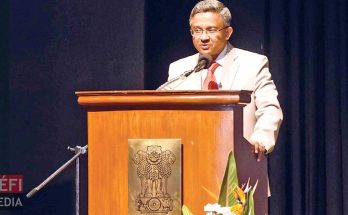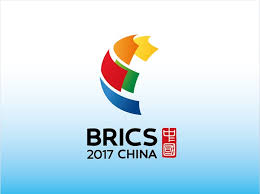
As China hosts the 9th BRICS summit, H.H.S. Viswanathan provides a broad-brush picture of what this grouping has achieved so far and offers his prognosis of India’s expectations and the BRICS’ positioning in a mutating world order by 2020.
The 8th BRICS Summit in Goa marked the 15th anniversary of an idea proposed in 2001. However, BRICS as a grouping has grown into something much wider and deeper in the intervening 15 years. South Africa was added to the group in 2011, enlarging it from four members to five. In terms of agenda and areas of interest also, BRICS has had a very successful evolution.
What does the future trajectory of BRICS look like? Will it continue to grow in strength and influence? Will some of the strategic competition between the members make it less effective? What will be the impact of the serious economic slowdown on three of the five members? Can BRICS make a lasting contribution in areas like Sustainable Development and Global Governance? These are some of the questions faced by the five countries. A medium and long-term vision is needed to take the group forward.
Basic Principles
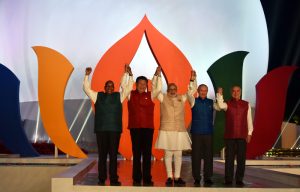
There are certain fundamental principles underlying BRICS, which are unlikely to change in the medium term. The most important among them would be the principles of sovereignty of states and Democratic Equity in International Relations. All the BRICS countries zealously guard their sovereign status and outside interference is frowned upon. They have also effectively articulated for equity among nations on the global scene. In this, they have the support of most of the members of the United Nations General Assembly (UNGA). Closely related to this is the idea of centrality of the United Nations. Multi-polarity and multilateralism have been the bedrock of BRICS countries. The various Summit Declarations have clearly come out with strong criticisms of unilateral actions by individual countries.
Another institution to which BRICS attach great significance is the World Trade Organization (WTO). The proliferation of mega Free Trade Arrangements (FTAs) among select countries has caused considerable anxiety among the developing world. The BRICS countries feel that this undermines a global, open and rule-based system of trade and investments.
Comprehensive reforms of the UN are supported by all five countries, but there are differences in the details. On the question of the expansion of the United Nations Security Council (UNSC) for example, Brazil, India and South Africa, aspirants for permanent membership in an expanded Council, are on the same page. Russia and China have not, so far, categorically endorsed this. They have only said that “they support the aspiration of Brazil, India and South Africa to play a greater role in the UN.” There are two important questions here: one is, whether BRICS as a group can have a united stand and two, even with such a stand, can the UNSC be expanded given the other complexities on the issue.
The future evolution of BRICS will naturally depend on the successes achieved so far. There are many areas where considerable ground has been covered and these will be pursued further. What are these areas of interest?
Intra-BRICS Cooperation
This was one of the fundamental pillars of BRICS right from the first summit in Yekaterinburg. Intra-BRICS cooperation arises from the similarities in many of the problems faced by the BRICS countries, and the convergences that exist in addressing these. The areas pertain to health, education, inclusive growth, environment, urbanisation, food and energy security, sustainable development and peace & security. Working groups both at Track 1 and Track 2 levels have identified issues and are addressing solutions. Of course, progress in these areas will be gradual and incremental. The most important aspect would be to bring in new paradigms relevant to BRICS and emerging and developing economies. The original aim of BRICS to generate a new geography neutral and developing world centric narrative on growth and development should not be lost sight of. Blindly following western models may not lead to long-term benefits.
Reforming Global Financial Institutions
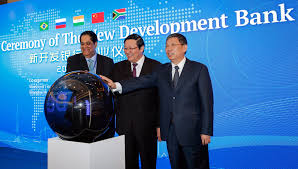 So far, only limited success has been achieved in reforming the Bretton Woods Institutions (BWIs) like the International Monetary Fund (IMF) and the World Bank (WB). Para 30 of the Goa Declaration reiterates the BRICS resolve to ensure the early finalisation of the new quota formula. Associated with that is the question of the selection processes of the Heads of IMF and the World Bank. Fortunately, there is widespread belief that unless these institutions reform themselves with changing times, they may soon become irrelevant. The establishment of the New Development Bank (NDB) and the Contingency Reserve Arrangement (CRA) in a record time of three years is a wake-up call to global institutions which resist reforms. The political message of the founding of NDB and CRA is very significant. It is the first time in 200 years that a global institution has been created without the participation of the developed world. Having established the two institutions, BRICS should now take them to higher levels. How can they be made innovative with initiatives, which are friendly to the developing world, and also economically viable? This will require setting up of a first-rate think tank. One could call it the New Development Bank Institute (NDBI), which will provide the academic and intellectual inputs for out-of-the-box ideas. Such an institute is already being talked about and finds a mention in the Goa Action Plan.
So far, only limited success has been achieved in reforming the Bretton Woods Institutions (BWIs) like the International Monetary Fund (IMF) and the World Bank (WB). Para 30 of the Goa Declaration reiterates the BRICS resolve to ensure the early finalisation of the new quota formula. Associated with that is the question of the selection processes of the Heads of IMF and the World Bank. Fortunately, there is widespread belief that unless these institutions reform themselves with changing times, they may soon become irrelevant. The establishment of the New Development Bank (NDB) and the Contingency Reserve Arrangement (CRA) in a record time of three years is a wake-up call to global institutions which resist reforms. The political message of the founding of NDB and CRA is very significant. It is the first time in 200 years that a global institution has been created without the participation of the developed world. Having established the two institutions, BRICS should now take them to higher levels. How can they be made innovative with initiatives, which are friendly to the developing world, and also economically viable? This will require setting up of a first-rate think tank. One could call it the New Development Bank Institute (NDBI), which will provide the academic and intellectual inputs for out-of-the-box ideas. Such an institute is already being talked about and finds a mention in the Goa Action Plan.
BRICS Initiatives on Global Governance
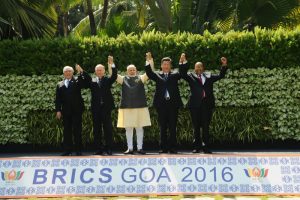
The existing Global Governance norms, which were put in place after World War II, have clearly become outdated thanks to the globalisation process and the rise of emerging powers. A new look is needed to make the norms more effective. Naturally, there will be a pushback on this by the status quo powers. Nonetheless, there are voices even among them which realise that changes are needed, and the sooner the better. BRICS countries have a very objective and inclusive approach to this issue. No one is interested in a complete overthrow of the existing order and institutions. But it is for the benefit of everyone that suitable changes are made, wherever necessary, to ensure a fair, just, equitable and sustainable global order.
Besides the BWIs and the United Nations, there are other global institutions which need to be addressed. BRICS, after establishing the NDB and CRA, is in a position to venture into creating other institutions. It is significant that the Goa Declaration (Para 44) mentions the possibility of setting up an independent BRICS Rating Agency, based on market-oriented principles in order to strengthen the global governance architecture. This has been long overdue. The existing three major Rating Agencies, including Standard and Poor, Moody’s and Fitch, which account for over 90 per cent of the business, came under serious criticism in the 2008 global financial crisis for giving high credit ratings to dubious corporates. Their ratings of developing and emerging economies have also been found to be biased.
Another focus area for BRICS relate to standardisation and benchmarking. It is time that BRICS has its own standards and benchmarks for various products and processes. The international taxation policies and tax regimes are today controlled totally by the OECD countries. Yet, the harmful practice of Base Erosion and Profit Shifting (BEPS) resorted to by big business houses and Multinational Corporations (MNCs) affect the developing world the most. The annual loss in tax revenue to the developing countries, due to this practice, amounts to more than $135 billion which dwarfs the total ODA given by developed countries. But there is, as yet, no place for the developing countries in the exclusive club which decides policies on BEPS. This anomaly has to be addressed and the BRICS grouping has to keep up the pressure in this regard.
Internet management is another area where BRICS and the developing world have a great interest. After all, in pure numbers, it is the developing world which is going to have the maximum internet penetration. In this connection, BRICS has been advocating an open, non-fragmented and secure internet. They consider it a global resource and want states to participate on an equal footing with the involvement of relevant stake-holders (Para 67 of Goa Declaration)
South-South Outreach
South-South cooperation was not one of the main objectives of BRICS in the initial stages. Over the years, with its increasing influence, BRICS, however, came to realise that they are ideally suited to play a cooperative role in the growth and development of the developing world without claiming any leadership role. The logic is that critical issues faced by BRICS are also being faced by many countries in Asia, Africa and Latin America. The NDB and CRA have also been envisaged to assist developing countries in due course.
South-South cooperation got a boost with the outreach efforts of the BRICS summits. It all started in 2013 when South Africa invited many African leaders to the Durban summit. In 2014, at Fortaleza, Brazil gave an opportunity for several Latin American leaders to interact with their BRICS counterparts. Russia, in 2015, held the Shanghai Cooperation, Organisation (SCO) Summit back-to-back with the BRICS Summit, so that the leaders of the two organisations could exchange ideas. In 2016, India decided to invite the Bay of Bengal Initiative for Multi-Sectoral Technical and Economic Cooperation (BIMSTEC) leaders to Goa. These outreach activities have widened the BRICS agenda to include cooperation with other like-minded countries, and are likely to be strengthened further in future.
India’s Expectations
Sceptics of BRICS in India have repeatedly raised the question of tangible benefits for India from BRICS. Should India be investing in BRICS? How effective could BRICS be, given the strategic competition between India and China? These are valid questions and need to be addressed. The five countries are not blind to the contradictions and divergences that exist within the group. Yet, in the last decade, the BRICS nations have been able to identify many convergences and decided to work on them for not only their benefit, but also for the larger developing world.
For India, apart from the gains emanating from intra-BRICS cooperation, there is a visible additionality to the country’s global clout. There are areas in global governance where India by itself cannot bring about changes. However, BRICS as a platform has the potential to do this. A multi-polar or polycentric world of the future is more likely to have these kinds of groupings as the centres of influence, rather than individual countries, and that is where the value of BRICS lies.
Author Profile
Latest entries
 DiplomacyAugust 29, 2017Bolstering Brics: Mapping New Pathways
DiplomacyAugust 29, 2017Bolstering Brics: Mapping New Pathways Africa InsightsDecember 18, 2015FOCAC 2015: Consolidating China-Africa relations
Africa InsightsDecember 18, 2015FOCAC 2015: Consolidating China-Africa relations Africa InsightsApril 16, 2015A landmark election, and a new President
Africa InsightsApril 16, 2015A landmark election, and a new President China ConnectNovember 6, 2014China’s efforts to improve Rule of Law
China ConnectNovember 6, 2014China’s efforts to improve Rule of Law







